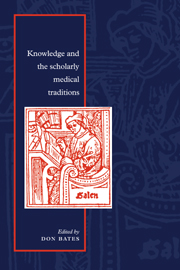Book contents
- Frontmatter
- Contents
- List of illustrations
- List of contributors
- Acknowledgements
- 1 Scholarly ways of knowing: an introduction
- Part 1 Scholarly medicine in the West
- 2 Epistemological arguments in early Greek medicine in comparativist perspective
- 3 Autopsia, historia and what women know: the authority of women in Hippocratic gynaecology
- 4 The growth of medical empiricism
- 5 Scholarship and social context: a medical case from the eleventh-century Near East
- 6 The experience of the book: manuscripts, texts, and the role of epistemology in early medieval medicine
- 7 Artifex factivus sanitatis: health and medical care in medieval Latin Galenism
- 8 Epistemology and learned medicine in early modern England
- Part 2 Chinese traditional medicine
- Part 3 Āyurvedic medicine
- Part 4 Commentaries
- Index
3 - Autopsia, historia and what women know: the authority of women in Hippocratic gynaecology
Published online by Cambridge University Press: 01 February 2010
- Frontmatter
- Contents
- List of illustrations
- List of contributors
- Acknowledgements
- 1 Scholarly ways of knowing: an introduction
- Part 1 Scholarly medicine in the West
- 2 Epistemological arguments in early Greek medicine in comparativist perspective
- 3 Autopsia, historia and what women know: the authority of women in Hippocratic gynaecology
- 4 The growth of medical empiricism
- 5 Scholarship and social context: a medical case from the eleventh-century Near East
- 6 The experience of the book: manuscripts, texts, and the role of epistemology in early medieval medicine
- 7 Artifex factivus sanitatis: health and medical care in medieval Latin Galenism
- 8 Epistemology and learned medicine in early modern England
- Part 2 Chinese traditional medicine
- Part 3 Āyurvedic medicine
- Part 4 Commentaries
- Index
Summary
It is axiomatic that virtually all the extant medical treatises of Graeco-Roman antiquity were written by men, but the extent of women's role in the compilation of these writings is debated. Paola Manuli believes the Hippocratics treated the female body as a dumb canvas on which to project their theories, while Aline Rousselle claims the Hippocratic treatises were little more than the written mouthpiece for the female oral tradition. Needless to say, most scholars believe the truth lies somewhere between the two. G.E.R. Lloyd has drawn attention to the interplay between developing scientific medicine and folk medicine, and Ann Ellis Hanson divides women into two types: the inexperienced, whose knowledge of her own body is indeed shaped by the physician, and the ‘woman of experience’, who functions as an authoritative source for male physicians. The very existence of this debate, however, indicates the recognition that for the ancient Greeks and Romans the epistemological basis of their gynaecology differs somehow from that on which the rest of their medicine is founded. Neither ancient authors nor modern scholars are so concerned to analyse the contribution of the male clientele to Hippocratic theories and treatment.
In practising clinical medicine the ancient physician recognized two sources of information: autopsia, his own observations, and historia, what he was told by other people. We might assume that it was the social impropriety of a doctor examining a woman's body in an intimate manner which caused a different emphasis in the epistemology of the gynaecology by restricting the opportunities ancient physicians had for autopsia in the case of women's diseases, but this is not acknowledged as a problem by the Hippocratics.
- Type
- Chapter
- Information
- Knowledge and the Scholarly Medical Traditions , pp. 41 - 59Publisher: Cambridge University PressPrint publication year: 1995
- 2
- Cited by



